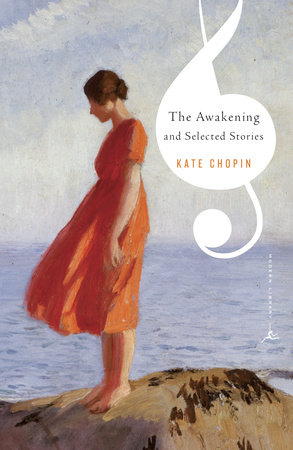
The Awakening
By Halima Elmajdoubi
In many novels, the protagonist is often the character that you root for. They are the hero that will save the day, or the underdog that you wish will inevitably prove themselves, discover true love, escape persecution, or all of the above. Right?
This could not be said for Edna Pontellier–or at least not at first.
In The Awakening by Kate Chopin, the protagonist, Edna Pontellier, is not particularly likable, nor immediately relatable. I did not turn the page in anticipation of Edna’s ultimate success but in anticipation of the self-destructive and childish act that would finally result in Edna’s acceptance of reality and consequence.
So why am I bothering to write about this book now?
I first read The Awakening in my AP Literature class as a high school senior. At the time, I was in the midst of a reading slump. I read little beyond what was required for my classes, and my personal library, composed mostly of the popular dystopian and fantasy novels that everyone else was also reading, no longer excited me.
Then I studied The Awakening and was captivated by the images, motifs, and symbols that form the slippery slope that the protagonist descends throughout the story. The Awakening showed me the ways that every detail and nuance on a single page could combine to illuminate the complex meaning of a literary work, which challenged everything I had previously enjoyed about books and revived my love for the written word. In the story, Edna Pontellier is a wife and mother, caged within the strict societal standards and traditions akin to the Louisiana Creole culture of the 1890s. The story opens on the Grand Isle, where the Pontelliers are vacationing alongside other wealthy Creoles. There, Edna meets a woman who defies societal norms: an unmarried, independent, and admired musician, who exposes Edna to the possibility of a different world, one where a woman could exist for no one but herself. Upon returning home, Edna longs for her own identity, desperate to flee the responsibilities of domesticity for an idealized life of passion and excitement. However, she is increasingly blinded by her own naivety, unable to confront the hard reality that she lacks the maturity and strength to overcome the negative consequences of challenging society. That the ideal life she envisioned was impossible from the beginning.
The book is ingeniously woven so the reader can recognize the futility of Edna’s actions when the character cannot even see it for herself. The story is narrated in the third person, mainly focalized through Edna’s perspective so that the reader is consistently aware of her thoughts and emotions. However, in scenes in which the protagonist is absent, the minds of other characters, including Edna’s husband, Lèonce Pontellier, and Edna’s friend, Adèle Ratignolle, are also revealed, particularly in their perceptions of Edna’s increasingly careless actions throughout the story.
One instance in which the reader is invited into our protagonist’s mind is when her self-destructive search for identity reaches a climax.
In this scene, Edna witnesses her friend, Adèle Ratignolle, give birth to another child. Adèle is the epitome of Creole standards, a constant reminder of everything Edna should be, and everything Edna aspires to outrun. While Adèle cries out in labor, the narrator reveals only Edna’s thoughts as she is overcome with absolute dread, emotions which stem from the formerly repressed memories of her own agonizing child birthing experience:
Edna began to feel uneasy. Her own like experiences seemed far away, unreal, only half-remembered. She recalled faintly an ecstasy of pain, the heavy odor of chloroform, a stupor which had deadened sensation and an awakening to find a little new life to which she had given being, added to the great unnumbered multitude of souls that come and go.
The miserable recollection of Edna’s own labor is characterized by the “heavy odor of chloroform,” alluding to Edna’s memory of being weighed down by drugs, unable to control her situation. Upon waking, she refers to her newborn not with maternal love and affection, but as yet another soul to add to “the great unnumbered multitude,” as if this baby, this extension of her own person, means no more to her than anyone else on the planet. Chopin continues:
She began to wish she had not come. But Edna did not go. With an inward agony, with a flaming, outspoken revolt, she witnessed the scene [of] torture. She was still stunned and speechless with emotion when later she leaned over her friend to kiss her and softly say good-by. Adèle, pressing her cheek, whispered in an exhausted voice, ‘Think of the children, Edna. Oh think of the children! Remember them!
Since her return from vacationing on the Isle, Edna had increasingly rejected her maternal and societal duties, convinced that she could evade the consequences of avoiding her husband and neglecting her children. However, at this moment Edna is confronted with the truth. While before, chloroform had numbed her to the reality of motherhood, there is no escape from the scene before her now or from the objection of those closest to her.
Adèle reminds our protagonist that her life is not solely her own, that there are children whom she has brought into the world and cannot just ignore. The narration of this scene is focalized through our protagonist’s perspective as opposed to her friend’s; however, the urgency of Adèle’s warning, despite the fact that she was in labor only moments ago, reveals Adèle’s strong disapproval of the dangerous path that Edna has chosen to travel.
At this moment, Edna, “stunned and speechless,” realizes that there is no true escape after all, that she will forever be bound by the expectations of motherhood, unable to achieve independence. With access to Edna’s repressed memories, the narrator exposes the gravity of Edna’s contempt for motherhood, and the hopelessness that overcomes her as her fragile idealism is shattered.
This scene is the essence of the book: Edna’s awakening, and culminates in the tragic, yet beautiful ending in which our protagonist returns to the place where her story had begun: the Grand Isle.
Alone on the beach, Edna strips naked, finally freeing herself of societal constraints. At this moment, the narration continues from an outside observer’s perspective, however, with continued access to the protagonist’s thoughts. Edna appears as a “new-born creature, opening its eyes in a familiar world that it had never known”. The waves encircle her pure being, and the seductive voice of the sea lures her “on and on” until she has no more strength to swim any longer.
 Her arms and legs were growing tired.
Her arms and legs were growing tired.
She thought of Léonce and the children. They were a part of her life. But they need not have thought that they could possess her, body and soul…
Exhaustion was pressing upon and overpowering her.
Far into the sea, Edna looks back to the shore and discovers that she is too far gone, now depleted of the strength to swim back to the miserable life that awaits her on the shore. In her last moments, she concedes that her husband and her children could take her body from her, but they could not have her soul.
Through an observer’s perspective, the narration illustrates Edna’s physical surrender to the ocean. However, the book’s final lines are again focalized through our protagonist’s thoughts, as she exercises the final control of her own life, her own identity, and succumbs to the sea.
When I’d first reached the ending, only one thought remained in my mind: “You’re kidding, that’s it?” Then, my teacher encouraged us to see its beauty. Although tragic, by allowing herself to drown, Edna was finally victorious, finally free.
The book could not have ended any other way.
Chopin’s use of third person narration enables the reader to witness Edna’s reckless and futile actions both from the outside and from a distance, as well as through the eyes of the protagonist herself.
Unfortunately, the story’s themes of identity and the struggle to escape societal constraints are not any less prevalent today than they had been in Chopin’s lifetime. The expectations imposed on women across the globe to be like Adèle Ratignolle, the doting wife and mother, have not vanished from reality, or from modern works of literature. While I would not go as far as to consider Edna Pontellier a role model, her desire to become her own person is not without merit. Under the weight of expectations, her world had become stagnant, and like women throughout history, she lacked the strength and the resources to achieve a different life.
The Awakening is beautifully written, intelligent, and insightful. It is the story of a woman’s awakening; intellectually, spiritually, and sexually. While the reader may not always agree with the protagonist’s actions, one cannot also help but wonder what they would have done themselves in her position. It is a book that prompts you to think and question, and Edna Pontellier’s journey is invaluable to all who read it.